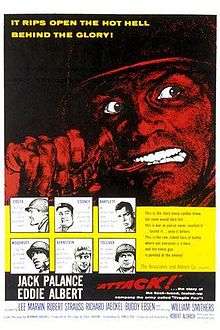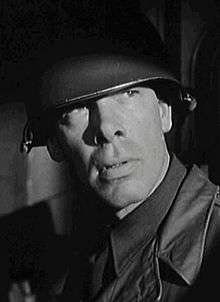Attack (1956 film)
| Attack! | |
|---|---|
 Theatrical release poster | |
| Directed by | Robert Aldrich |
| Produced by | Robert Aldrich |
| Screenplay by | James Poe |
| Based on |
Fragile Fox by Norman Brooks |
| Starring |
Jack Palance Eddie Albert Lee Marvin William Smithers Robert Strauss Buddy Ebsen |
| Music by | Frank De Vol |
| Cinematography | Joseph F. Biroc |
| Edited by | Michael Luciano |
Production company | |
| Distributed by | United Artists |
Release dates |
|
Running time | 107 minutes |
| Country | United States |
| Language | English |
| Budget | $810,000[1] |
| Box office |
$2 million (US)[2] 1,493,421 admissions (France)[3] |
Attack, also known as Attack!, is a 1956 American anti-war drama film. It was directed by Robert Aldrich and starred Jack Palance, Eddie Albert, Lee Marvin, William Smithers, Robert Strauss, Richard Jaeckel, Buddy Ebsen and Peter van Eyck. The cinematographer was Joseph Biroc.
"A cynical and grim account of war",[4] the film is set in the latter stages of World War II and tells the story of a front line combat unit led by a cowardly captain clearly out of his depth as well as a tougher subordinate and an executive officer who both threaten to do away with him. As the official trailer put it: "Not every gun is pointed at the enemy!"
The film won the 1956 Italian Film Critics Award.
Plot
Europe 1944: Fragile Fox is a company of the National Guard of the United States based in a Belgian town near the front line. They are led by Captain Erskine Cooney (Eddie Albert), who appears to be better at handling red tape than combat. Cooney freezes under fire and cannot bring himself to send more men into battle to reinforce those already under attack. The increasing and unnecessary loss of life is lowering morale and trying the patience of platoon leader Lieutenant Joe Costa (Jack Palance). The executive officer, Lieutenant Harold Woodruff (William Smithers, in his first credited screen role) is the "voice of reason" who tries to keep the peace between Cooney and Costa. Woodruff tries to get Cooney reassigned to a desk job. It is well known that Cooney owes his position to battalion commander Lieutenant Colonel Clyde Bartlett (Lee Marvin), who has known the Cooney family since he was a 14-year-old clerk in the office of Cooney's father, a top judge. The judge's influence could be very useful to Bartlett's post-war political ambitions.
When the Germans launch the Battle of the Bulge, Bartlett orders Cooney to seize the town of La Nelle. Unsure whether the Germans are there or not, Cooney overrules an all-out attack and decides that Costa should lead a reconnaissance mission. Costa agrees, provided that both Cooney and Woodruff promise to send reinforcements if necessary. As the platoon approaches La Nelle, the men come under fire. Most of them are killed or wounded. Costa and four of his men (Sergeant Tolliver, Bernstein, PFC Ricks and Pvt. Snowden) take refuge in a farmhouse. When Costa calls for reinforcements, Cooney turns to drink. Costa and his men capture a German SS officer and a soldier, but when panzers appear, he has no choice but to retreat. He furiously tells Woodruff over the radio to warn Cooney that he's "coming back!"

In the confusion, Costa goes missing in action. The rest of the men manage to get back to town, though Ricks (James Goodwin) is killed. The men show their contempt for Cooney. Bartlett reprimands him for failing to send in his entire company to take La Nelle. As a result, the German Army is advancing on their position; he tells Woodruff and Cooney that they must hold. Bartlett threatens to arrest Cooney if he falls back, as it would leave another company unprotected. He strikes Cooney after he begs to be reassigned. With the pressure building up inside him, Cooney turns to drink again, but Woodruff smashes the bottle. After that, Cooney breaks down. Feeling sorry for him, Woodruff tells him to sleep it off and is about to assume command when Costa suddenly reappears, determined to kill Cooney. As they argue, they are told by Corporal Jackson (Jon Shepodd) that the town is being overrun. Costa disables an enemy tank with a bazooka, but is gravely wounded when another tank drives over his arm.
Woodruff, Tolliver, Bernstein, Jackson and Snowden (Richard Jaeckel) take refuge in a basement, but Bernstein is injured in the leg. They try to get out, but the way is blocked. Costa suddenly appears. With only minutes to live, he appeals to God to give him enough strength to kill Cooney, but collapses and dies. Cooney suggests surrendering, even though they have not been discovered. Woodruff warns him that he will shoot him if he tries. When Cooney does, Woodruff kills him.
Woodruff insists that Tolliver place him under arrest, but he and the other GIs reject this. They then take turns shooting Cooney's body themselves, all except Snowden, who has gone to see if the Germans heard the shots. Allied reinforcements arrive, and the Germans retreat.
Told by the men that Cooney was killed by the Germans, Bartlett puts Woodruff in command. Bartlett gives Woodruff a field promotion to captain, but then announces that he is going to nominate Cooney for the Distinguished Service Cross. Outraged, Woodruff accuses Bartlett of orchestrating the whole thing in order to get rid of Cooney and gain favor with his powerful father. Bartlett remarks that Woodruff has too much to lose if he makes the whole affair public, but Woodruff calls General Parsons on the radio to file a full report.
Cast
- Jack Palance as Lt. Joe Costa
- Eddie Albert as Capt. Erskine Cooney
- Lee Marvin as Lt. Col. Clyde Bartlett
- William Smithers as Lt. Harold "Harry" Woodruff
- Robert Strauss as Pfc. Bernstein
- Richard Jaeckel as Pvt. Snowden
- Buddy Ebsen as T/Sgt. Tolliver
- Jon Shepodd as Cpl. John Jackson
- Peter van Eyck as SS Captain
- James Goodwin as Pfc. Ricks
- Steven Geray as Otto, German NCO
- Jud Taylor as Pvt. Jacob R. Abramowitz (credited as Judson Taylor)
- Strother Martin as Sgt. Ingersol
Production
The film was based on Norman Brooks's stage play, Fragile Fox. Director Aldrich bought the rights when he failed to obtain those for Irwin Shaw's The Young Lions and Norman Mailer's The Naked and the Dead.[5]
Due to the nature of the film, which cast officers as either cowards or Machiavellian manipulators, the US Defense Department refused to grant production assistance. Critics attacked this attitude, pointing out the heroic and noble behavior of other officers like Costa and Woodruff who were "more representative of the Army than the cowardly captain, who is clearly an exception."[5]
Aldrich is quoted, "The Army saw the script and promptly laid down a policy of no co-operation, which not only meant that I couldn't borrow troops and tanks for my picture — I couldn't even get a look at Signal Corps combat footage. I finally had to buy a tank for $1,000 and rent another from 20th Century-Fox."[6]
Aldrich directed Attack! without the big budget that other war productions were getting at the time. It was shot in thirty-two days on the back lot of RKO Studios with a small cast and budget and a few pieces of military equipment, including the two tanks.[5]
The opening title sequence depicting off-duty soldiers was created by Saul Bass.
Eddie Albert, who played the cowardly Cooney, was in reality a decorated hero in the World War II Pacific Theater. Before World War II commenced he was secretly working for U.S. Army intelligence photographing German U-boats in Mexico. He was awarded the Bronze Star for heroism, rescuing American marines during the Battle of Tarawa while under heavy gunfire in 1943. He also lost a portion of his hearing from the noise of the battle.[7]
Accolades
The film is recognized by American Film Institute in these lists:
- 2001: AFI's 100 Years...100 Thrills – Nominated[8]
DVD
Attack was released to DVD by MGM Home Video on May 20, 2003 as a Region 1 fullscreen DVD and to Blu-ray on May 2, 2013 by the French company Filmedia (under license from MGM) as a Region 2 Blu-ray DVD.
See also
References
- ↑ Alain Silver and James Ursini, Whatever Happened to Robert Aldrich?, Limelight, 1995 p 246
- ↑ 'The Top Box-Office Hits of 1956', Variety Weekly, January 2, 1957
- ↑ French box office results for Robert Aldrich films at Box Office Story
- ↑ The Fourth Virgin Film Guide, 1995
- 1 2 3 Long Pauses: Attack! (1956) Archived May 17, 2008, at the Wayback Machine.
- ↑ Knight, Arthur (1 September 1956). "Aldrich Against the Army". The Saturday Review. Retrieved 4 August 2014.
- ↑ Profile of Albert's WWII exploits
- ↑ "AFI's 100 Years...100 Thrills Nominees" (PDF). Retrieved 20 August 2016.
| Wikimedia Commons has media related to Attack! (1956 film). |